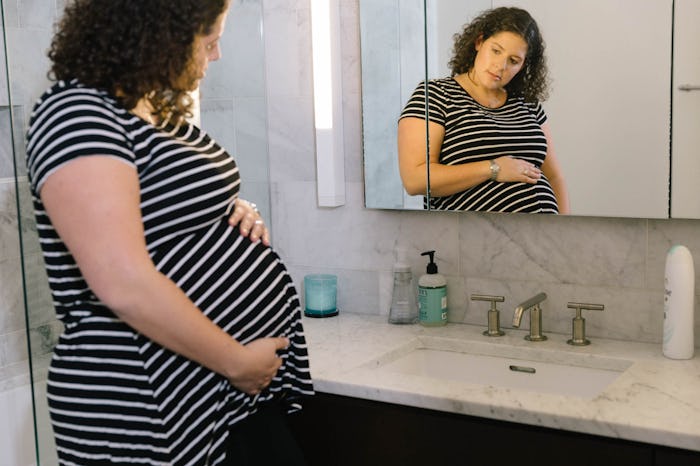Life
Everything You Need To Know About Kick Counts, According To An Expert
In the beginning of your pregnancy, you're just excited to feel your baby move. It feels fresh and new every time you get pregnant, and the spark of wonder is real and exhilarating. By month eight, however, you're feeling more like Ellen Ripley with a toothy alien about to eat its way through your guts. It's only when you notice a decrease that you get less annoyed and more concerned with your alien. You'll probably be told to do a "kick count," to measure activity, but you may be wondering, "Am I doing kick counts right?" There has to be a method to this activity and you're probably worried about doing it just right.
My OB-GYN never mentioned kick counts to me until I noticed one evening that my son wasn't moving — and hadn't moved in some time. It was then she guided me to start monitoring his movements, telling me that he should move about 10 times every two hours. Thankfully, nothing was amiss with my pregnancy, but it was enough to make me a bit paranoid and more than a bit obsessed. I worried over every roll, every kick, every elbow to the kidney that kid threw me. (Which were plenty. It was like being pregnant with a super limber MMA star.) Obsession isn't helpful, I can tell you that firsthand, but monitoring your baby's fitness is. How can you do it without freaking yourself out? I know that early in my next pregnancy I asked my doctor, "Am I doing kick counts right?" And I wasn't. Don't be me.
I've heard varying reports from friends on how their providers discussed kick counts with them. Some were very strict, old school style. They'd have them record kicks at the same time each day and chart that stuff like I chart how often my kids do their chores. Some of their providers were more blasé and relaxed about the whole thing, telling them that their baby should be active, and to keep an eye on it. If the movement drops, start counting.
Because I've heard so many different responses to kick counts, I decided to ask certified nurse midwife Angela Pok to find out how to do kick counts and why there's such a difference in advice given among practitioners. She tells Romper, "Some of us believe that pattern is more important than arbitrary numbers. For example, the method most commonly applied is called the Cardiff Method, which is where you count your baby's movements, and note how long it takes to feel the baby move 10 times." She said that while this does assure the mother that the baby is moving, your baby could move 20 times in an hour and then not move again for six, which is concerning. "I want to know that your baby is still having the active and rest periods he or she has always had. A big step away from routine is concerning. Moving less than normal is also concerning."
She says that babies typically have a few periods of the day they are reliably active. For me, it was after my one, blessed, allowed cup of coffee in the morning, and then again after my afternoon run and snack. My pregnancies all followed this routine for the most part. (If only they followed a routine today, I wouldn't need the above mentioned chore chart.)
"If you can feel they're active, then the charting method might create more anxiety than it does help monitor your baby," Pak notes. She says if you do feel a drop in movement, call your provider, and they'll most likely have you start counting, but it's likely not something you're going to need to do the duration of your pregnancy once their routine is again established. If you're ever worried about your baby's movement, call your provider. Mine was very calm and reassuring for me at the time, and my son was healthy and hale, just having a bit of a lazy moment. (I think it was the last one he ever had.)
Check out Romper's new video series, Romper's Doula Diaries:
Check out the entire Romper's Doula Diaries series and other videos on Facebook and the Bustle app across Apple TV, Roku, and Amazon Fire TV.
